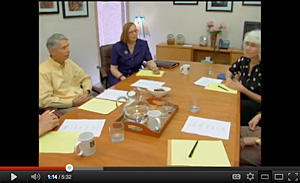What is Collaborative Practice?
Primarily Collaborative Practice is a new method for resolving and finalizing issues related
to securing a dissolution/divorce of your marriage or partnership without court. The key
component in my mind is that YOU are in control of your process, with the support of those
professionals you choose to work with you. I will help you design the right process and team to
help you through this transition.
Following is the full International
Academy of Collaborative Professionals (IACP) explanation of
Collaborative Practice:
Collaborative Practice is a voluntary dispute resolution process in which parties settle without
resort to litigation. In Collaborative Practice:
- The parties sign a collaborative participation agreement describing the nature and scope of the
matter;
- The parties voluntarily disclose all information which is relevant and material to the matter
that must be decided;
- The parties agree to use good faith efforts in their negotiations to reach a mutually
acceptable settlement;
- Each party must be represented by a lawyer whose representation terminates upon the undertaking
of any contested court proceeding;
- The parties may engage mental health and financial professionals whose engagement terminates
upon the undertaking of any contested court proceeding; and
- The parties may jointly engage other experts as needed.
Collaborative Practice, including Collaborative Law and interdisciplinary Collaborative Divorce,
is a new way for you to resolve disputes respectfully -- without going to court -- while working
with trained professionals who are important to all areas of your life. The term incorporates all
of the models developed since IACP's Minnesota lawyer Stu Webb created Collaborative Law ideas in
the 1980s.
The heart of Collaborative Practice or Collaborative Divorce (also called "no-court divorce,"
"divorce with dignity," "peaceful divorce") is to offer you and your spouse or partner the
support, protection, and guidance of your own lawyers without going to court. Additionally,
Collaborative Divorce allows you the benefit of child and financial specialists, divorce coaches
and other professionals all working together on your team.
In Collaborative Practice, core elements form your contractual commitments, which are to:
- Negotiate a mutually acceptable settlement without having courts decide issues.
- Maintain open communication and information sharing.
- Create shared solutions acknowledging the highest priorities of all.
 Learn more about how Collaborative Practice can work for you and your family.
Click on the image at right to watch "What is Collaborative Practice?" (5:32 minutes). Learn more about how Collaborative Practice can work for you and your family.
Click on the image at right to watch "What is Collaborative Practice?" (5:32 minutes).
|


